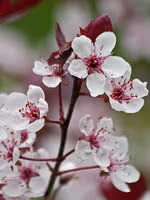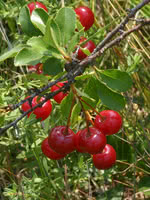Mon-Fri 9am - 5pm Mountain time
Purple Leaf Sand Cherry vs Cutie Pie Sour Cherry
Prunus x cistena
Prunus cerasus Cutie Pie
CUSTOM GROW
NOT AVAILABLE THIS SEASON - MIGHT RETURN
Purple Leaf Sand Cherry provides bright reddish-purple leaves that turn bronze-green in the fall. In the spring, tiny flowers with a pinkish white hue bloom. The flowers are small, but the impact comes from the shrub blossoming all at once.
The Purple leaf sand cherry can be susceptible to pests and diseases in more humid areas; a typical life span is approximately 15 years. Not suitable for a privacy hedge on its own but is often alternated with lilacs. Often used as an accent plant that attracts birds and bees.
The Cutie Pie Sour Cherry produces fruit that are sweeter than other sour cherry varieties. Good for fresh eating and for making jams and jellies. They are small in stature (shrub like) and multi stemmed, which makes for a good hedge.
They are cold hardy and are a hybrid of Mongolian and European sour cherries, produced by the University of Saskatchewan.
They have small, attractive, white flowers. Cutie Pie Sour Cherry trees are self pollinating and require moist, well-drained soil. For better yields, plant compatible cultivars such as the Romeo Cherry nearby.
Purple Leaf Sand Cherry Quick Facts
Cutie Pie Sour Cherry Quick Facts
Toxicity: the leaves and seed are slightly toxic

